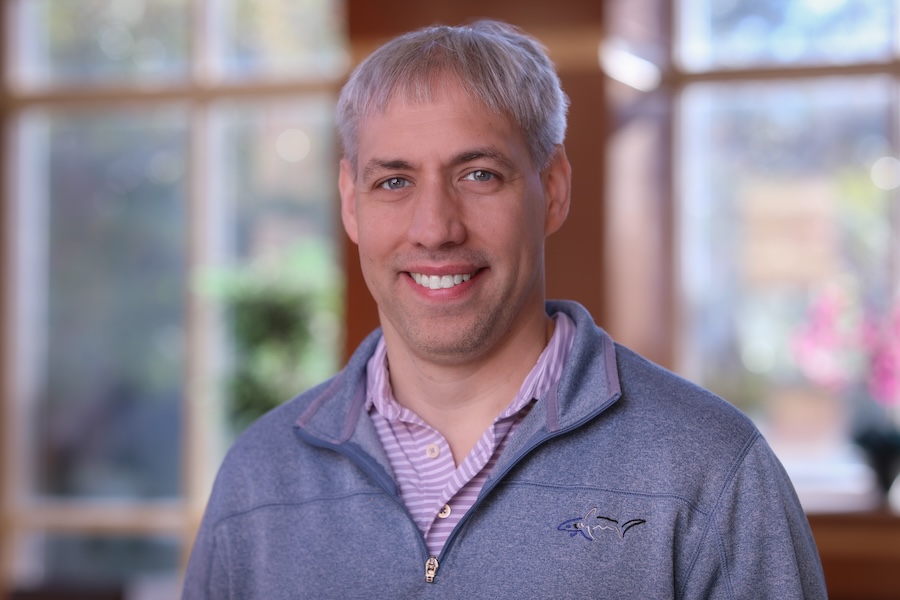FSU chemist named 2024 Rising Star by Academy of Science Engineering and Medicine of Florida

A Florida State University scientist has been honored by one of the state’s top scientific bodies for his achievements in photochemistry, specifically for his efforts towards improving the efficiency of solar-driven energy conversion.
Associate professor of chemistry and biochemistry Kenneth Hanson is among 19 researchers selected as a 2024 Rising Star by the Academy of Science Engineering and Medicine of Florida. This year’s Rising Stars were recognized during ASEMFL’s annual meeting Nov. 1-2 at the University of Central Florida.
“To be included in this group of individuals is an honor,” Hanson said. “Florida’s scientists are arguably underrepresented on the national stage despite many outstanding researchers living and working here. I really appreciate that ASEMFL helps elevate us all at the national and international levels.”
Established in 2018, ASEMFL informs Floridians of current and future issues in science, engineering, and medicine while addressing the associated challenges. Rising Stars are competitively selected from a pool of nominated researchers at universities across the state in recognition of their increasing contributions to the fields of science, engineering, and/or medicine and public health.
“Dr. Hanson is a leader in developing, controlling, and understanding the structures of layered assemblies on metal oxides for photochemical upconversion,” said Wei Yang, chair of the Department of Chemistry and Biochemistry. “Due to his research depth and intellectual breadth, he explores a broader area of materials chemistry related to photochemistry and has established a highly productive career.”
Of this year’s rising star honorees, Hanson is the only chemist and one of two awardees from FSU, alongside Daniel Hallinan, associate professor of chemical and biomedical engineering. Light-driven chemistry is at the heart of the Hanson Research Group, and ASEMFL selected Hanson for his progress towards surpassing theoretical solar cell efficiency limits using light energy upconversion. This process takes low-energy photons, such as infrared light, and converts them to higher-energy photons, such as UV or visible light, which can be used by a solar cell to generate electricity.
“Photon energy is often underappreciated, but anyone who has left their car in the sun can feel the result of that energy,” Hanson said. “Light-driven photosynthesis is the foundation of life on Earth, and while solar cells may be an obvious example, almost all alternative energy sources — such as hydroelectric or wind power — are the consequence of light energy hitting the earth.”
More broadly, the work in Hanson’s lab is a three-step process beginning with the synthesis of never-before-seen molecules. Then, after analyzing the molecules’ reactivity to light, the lab can test the molecules’ effectiveness in real-world applications such as solar energy conversion.
Through working with light-reactive materials, Hanson’s research often produces visually stunning outcomes, which are posted on the lab’s X and Instagram pages and have earned several awards, including Photo of the Month awards and 2014 Chemistry Photo of the Year from the American Chemical Society’s Chemical & Engineering News. The photos have also been publicized by the National Science Foundation, Chemistry World Magazine and numerous news outlets.
Hanson also prioritizes public scientific outreach, for which he won the Tallahassee Scientific Society’s 2023 Gold Medal Award. He has been the driving force behind “Ask a Scientist” and “Ask a Scientist Gaming,” a version of the original, in-person format adapted to live streaming via the Twitch platform and subsequent YouTube videos. The series regularly spotlights a rotating, interdisciplinary roster of scientists and encourages the public to ask questions.
“Ken’s rising star award highlights the excellence of the department’s faculty,” Yang said. “Over the past decade, we prioritized scholarship as a key development focus, and the emergence of mid-career research leaders underscores our success.”
Hanson was not the only College of Arts and Sciences faculty member to receive ASEMFL recognition this year. Laura Reina, distinguished research professor and Joseph F. Owens Endowed Professor in the Department of Physics, and Stephen Hill, professor of physics and director of the National High Magnetic Field Laboratory Electron Magnetic Resonance User Facility, were among 20 researchers selected for ASEMFL membership in 2024.
Newly inducted ASEMFL members are among the top scholars, experts and entrepreneurs in the fields of science, engineering and medicine who live and or work in Florida. They are considered for their potential to be inducted into the National Academy of Science, the National Academy of Engineering, and the National Academy of Medicine.
To learn more about the Academy of Science Engineering and Medicine of Florida, visit asemfl.org. For more information on Hanson’s work and chemistry research at FSU, visit chem.fsu.edu.
